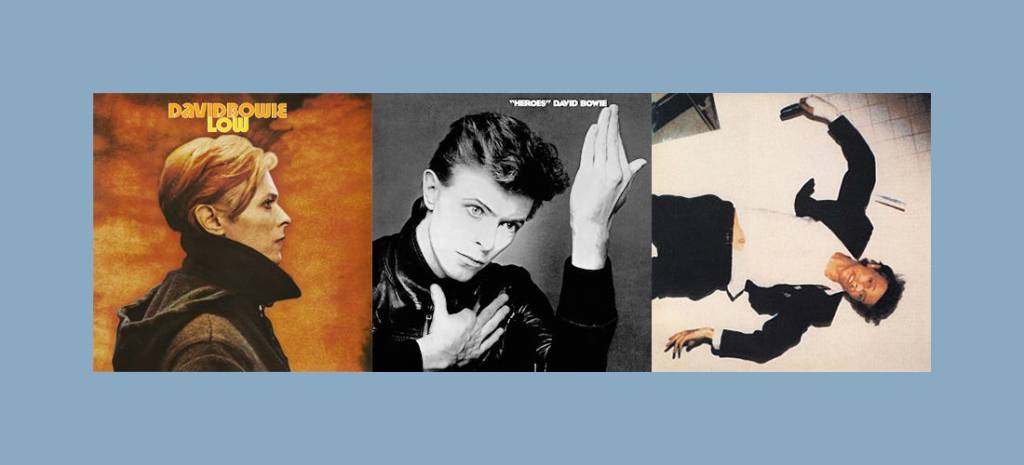LOW
David Bowie
1977
I lifted the format of these writeups directly from Tom Moon, author of 1000 Recordings to Hear Before You Die, as he was essentially my bridge between Guitar Hero and actually enjoying multiple genres of music. In his introduction to 1000 Recordings, Moon writes, “Finding renegade jazz pianist Cecil Taylor next to sensitive singer-songwriter James Taylor, who abuts the Russian composer Tchaikovsky underscores the astounding range of musical expression available, while subtly discouraging people from hanging out in their genre neighborhoods (ghettos?) they know best. This journey taught me that there’s great treasure waiting on the other side of wherever you draw your territorial lines.”
Few figures in music history underscore that philosophy more than Brian Eno, whose collaborators range from John Cale to John Cage, Sean Kuti to Sinead O’Connor, and perhaps most famously David Byrne to David Bowie. Eno’s influence is bringing ambient and classical into pop, African polyrhythm into rock, and subverting listener expectations in ways that enriched the quality of pop songwriting in ways we might now take for granted. While Bowie is quick to point out Eno is only a contributor and not a co-producer on his experimental Berlin Trilogy, Eno’s contributions help define what makes Low so different from Bowie’s Thin White Duke era of funk-infused pop.
The Man Who Fell To Earth, Bowie’s first starring role, was originally supposed to be scored by a version of the album that became Low – Nicolas Roeg rejected it and opted for a more traditional score from John Phillips of The Mamas and the Papas. Bowie was coming off Station to Station and the Thin White Duke, a persona defined by snorting coke and saying fascist bullshit. The plot of The Man Who Fell To Earth is that of an alien who becomes addicted to fame, alcohol, and TV before being imprisoned by the government – there’s temptation to apply that template to Bowie’s own decline (not to mention Bowie’s own Ziggy Stardust, whose “Rock N’ Roll Suicide” culminates the most iconic and beloved of all Bowie’s albums) but there’s no reason to read Bowie’s dependency as managed by outsiders or brought upon by anyone but himself.
Low reflects this fragmented place in life. The first half of the album, through “Always Crashing in the Same Car,” is a series of wonderful song fragments. They’re equal parts funk, blues, rock, maximalist decadence of layers upon layers and minimalist anti-pop with vocals that crash in with forty-five seconds remaining on the track (if at all.) For an act often defined by Bowie’s yelp and star persona, Low is a spotlight of Bowie the multi-instrumentalist, trading parts with longtime guitarist Carlos Alomar and session musician Ricky Gardiner. Without looking at liner notes, it’s easy to miss where Bowie fits into some of these tracks at all (sometimes, it’s mostly saxophone!) This album bops along through the transition of “Be My Wife” and “A New Career in a New Town,” slowing slightly and becoming more traditionally rock, “Be My Wife” a song that would have fit just as well on Diamond Dogs or Hunky Dory.
On the second side of the vinyl, Low shifts to “nighttime,” Bowie’s largest adventure into the Eno-esque ambient. It’s easy to imagine “Warszawa” or “Subterraneans” scoring The Man Who Fell To Earth – the jaunty funk of side one for the narcotic highs, the droning despair of “Art Decade” filling the scenes of isolation and dependency. This is, for me, where Bowie lays out the future that leads to The Next Day and Blackstar. He’s creating an eerier sense of drama than the pomp (fun) of “Five Years.” In confronting his own darkness, Bowie’s found something more honest, and it’s something harder to look at directly.
KEY TRACKS: “Sound and Vision,” “Warszawa”
CATALOG CHOICE: Heroes, Scary Monsters & Super Creeps
NEXT STOP: Who Is William Onyeabor, William Onyeabor
AFTER THAT: Surf’s Up, The Beach Boys
